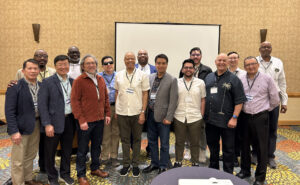
LAKE FOREST, Calif. (BP)–At Saddleback, we’re beginning to use the Internet as a tool to develop, grow and sustain our congregation. Of course, the Internet will never replace face-to-face fellowship, but it is a serious mistake to think that everything the church does — worship, discipleship, ministry, evangelism and fellowship — must be done within the four walls of a church building. In fact, I’m convinced that church buildings are a major barrier to exponential growth and that massive building programs are often a waste of money.
Currently there are several dozen extremely large church buildings being planned and built in America, but I believe they are the last of the dinosaurs. History has proven over and over that future generations never fill the cavernous temples of previous generations. For instance, every time Spurgeon’s Tabernacle was rebuilt (three times) it was downsized. The list of empty great cathedrals would be quite long. God wants to do something new in each generation. He blesses anointed people, not buildings.
We also need to remember that the period of fastest growth for Christianity was during the first 300 years — when there were no church buildings at all. And today all of the rapidly exploding church-planting movements around the world are multiplying without having physical church buildings.
Buildings should be tools for ministry, not monuments. I’ve said repeatedly to our congregation that Saddleback will never build a building that could not be torn down if it prevented us from reaching more people. Churches should focus on building people, not building buildings! That’s what being purpose-driven is all about. It’s a people-building process. Build your people before your steeple.
Our resistance to building buildings has been one of Saddleback’s values since its inception 21 years ago. One of the goals we set at Saddleback was to prove that you don’t need to build a building in order to grow a church. That’s why we waited until after our congregation was averaging more than 10,000 in attendance before we built our first building! I think we proved our point. Just because you are growing does not mean you should build a new or larger building.
Let me give you an example: Recently, we launched our annual fall spiritual growth campaign called “50 Days of Love.” One of the five components is an eight-week small group Bible study that augments my sermons. Because all of our adult education (i.e., “Sunday school”) takes place in homes — not buildings on our campus — we were able to start more than 200 new groups in one week.
You read that correctly. We enlisted and connected over 2,000 new people (who were not in any of our existing groups) into new Bible study groups in a single weekend. We would have never even considered numbers like that if we were trying to place them all on our campus.
I am absolutely opposed to building ANY size of facility that will only be used once or twice a week. It is poor stewardship of God’s money to build a facility just because the pastor wants to speak to everyone at one time.
In fact, here’s a little secret: Only pastors like really huge church services!
Normal people prefer more moderate-sized services, large enough to make the singing great, but not an overwhelming crowd. That’s why I’d rather have a building of 200 and fill it with five services than have a 1,000-seat auditorium that is filled only once a week and then left empty the rest of the week.
Yes, Saddleback has a 3,200-seat worship center, but we fill seven identical weekend services and thus are able to minister to more than 17,500 attenders weekly without the expense of a giant stadium-style arena.
If you must build, I urge you to at least consider making it a multi-purpose facility. That is much better stewardship of resources. At Saddleback, as soon as our weekend services are over, the seating arrangement in our worship center is taken down and the building is used in a variety of ways every day of the week. This releases an enormous amount of space for programs and money for missions.
I can already hear the critics of this suggestion making a good point for “the grandeur and beauty of worship architecture.” Of course, I believe in architectural beauty as an aid to worship too. But at what cost? Can anyone seriously give a New Testament justification for billions of dollars spent on debt for sanctuaries that are used for only a couple hours a week — especially when so many around the world have yet to hear the Good News?
I encourage you to experiment and look for ways to reach and grow people faster and cheaper, without buildings. Don’t let traditional methodology, or brick and mortar, or the lack of it, keep you from focusing on what matters most — changed lives!
–30–
Rick Warren offers stewardship materials, “Time to Build,” at his website www.pastors.com.

















